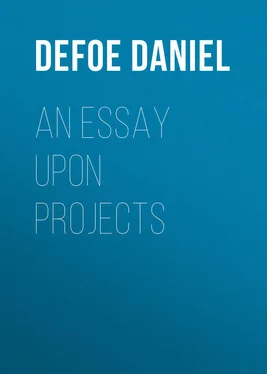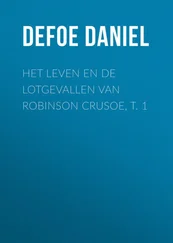Daniel Defoe - An Essay Upon Projects
Здесь есть возможность читать онлайн «Daniel Defoe - An Essay Upon Projects» — ознакомительный отрывок электронной книги совершенно бесплатно, а после прочтения отрывка купить полную версию. В некоторых случаях можно слушать аудио, скачать через торрент в формате fb2 и присутствует краткое содержание. Жанр: foreign_antique, foreign_prose, на английском языке. Описание произведения, (предисловие) а так же отзывы посетителей доступны на портале библиотеки ЛибКат.
- Название:An Essay Upon Projects
- Автор:
- Жанр:
- Год:неизвестен
- ISBN:нет данных
- Рейтинг книги:3 / 5. Голосов: 1
-
Избранное:Добавить в избранное
- Отзывы:
-
Ваша оценка:
- 60
- 1
- 2
- 3
- 4
- 5
An Essay Upon Projects: краткое содержание, описание и аннотация
Предлагаем к чтению аннотацию, описание, краткое содержание или предисловие (зависит от того, что написал сам автор книги «An Essay Upon Projects»). Если вы не нашли необходимую информацию о книге — напишите в комментариях, мы постараемся отыскать её.
An Essay Upon Projects — читать онлайн ознакомительный отрывок
Ниже представлен текст книги, разбитый по страницам. Система сохранения места последней прочитанной страницы, позволяет с удобством читать онлайн бесплатно книгу «An Essay Upon Projects», без необходимости каждый раз заново искать на чём Вы остановились. Поставьте закладку, и сможете в любой момент перейти на страницу, на которой закончили чтение.
Интервал:
Закладка:
OF PROJECTORS
Man is the worst of all God’s creatures to shift for himself; no other animal is ever starved to death; nature without has provided them both food and clothes, and nature within has placed an instinct that never fails to direct them to proper means for a supply; but man must either work or starve, slave or die. He has indeed reason given him to direct him, and few who follow the dictates of that reason come to such unhappy exigences; but when by the errors of a man’s youth he has reduced himself to such a degree of distress as to be absolutely without three things – money, friends, and health – he dies in a ditch, or in some worse place, a hospital.
Ten thousand ways there are to bring a man to this, and but very few to bring him out again.
Death is the universal deliverer, and therefore some who want courage to bear what they see before them, hang themselves for fear; for certainly self-destruction is the effect of cowardice in the highest extreme.
Others break the bounds of laws to satisfy that general law of nature, and turn open thieves, house-breakers, highwaymen, clippers, coiners, &c., till they run the length of the gallows, and get a deliverance the nearest way at St. Tyburn.
Others, being masters of more cunning than their neighbours, turn their thoughts to private methods of trick and cheat, a modern way of thieving every jot as criminal, and in some degree worse than the other, by which honest men are gulled with fair pretences to part from their money, and then left to take their course with the author, who skulks behind the curtain of a protection, or in the Mint or Friars, and bids defiance as well to honesty as the law.
Others, yet urged by the same necessity, turn their thoughts to honest invention, founded upon the platform of ingenuity and integrity.
These two last sorts are those we call projectors; and as there was always more geese than swans, the number of the latter are very inconsiderable in comparison of the former; and as the greater number denominates the less, the just contempt we have of the former sort bespatters the other, who, like cuckolds, bear the reproach of other people’s crimes.
A mere projector, then, is a contemptible thing, driven by his own desperate fortune to such a strait that he must be delivered by a miracle, or starve; and when he has beat his brains for some such miracle in vain, he finds no remedy but to paint up some bauble or other, as players make puppets talk big, to show like a strange thing, and then cry it up for a new invention, gets a patent for it, divides it into shares, and they must be sold. Ways and means are not wanting to swell the new whim to a vast magnitude; thousands and hundreds of thousands are the least of his discourse, and sometimes millions, till the ambition of some honest coxcomb is wheedled to part with his money for it, and then ( nascitur ridiculus mus ) the adventurer is left to carry on the project, and the projector laughs at him. The diver shall walk at the bottom of the Thames, the saltpetre maker shall build Tom T – d’s pond into houses, the engineers build models and windmills to draw water, till funds are raised to carry it on by men who have more money than brains, and then good-night patent and invention; the projector has done his business and is gone.
But the honest projector is he who, having by fair and plain principles of sense, honesty, and ingenuity brought any contrivance to a suitable perfection, makes out what he pretends to, picks nobody’s pocket, puts his project in execution, and contents himself with the real produce as the profit of his invention.
OF BANKS
Banks, without question, if rightly managed are, or may be, of great advantage, especially to a trading people, as the English are; and, among many others, this is one particular case in which that benefit appears: that they bring down the interest of money, and take from the goldsmiths, scriveners, and others, who have command of running cash, their most delicious trade of making advantage of the necessities of the merchant in extravagant discounts and premiums for advance of money, when either large customs or foreign remittances call for disbursements beyond his common ability; for by the easiness of terms on which the merchant may have money, he is encouraged to venture further in trade than otherwise he would do. Not but that there are other great advantages a Royal Bank might procure in this kingdom, as has been seen in part by this; as advancing money to the Exchequer upon Parliamentary funds and securities, by which in time of a war our preparations for any expedition need not be in danger of miscarriage for want of money, though the taxes raised be not speedily paid, nor the Exchequer burthened with the excessive interests paid in former reigns upon anticipations of the revenue; landed men might be supplied with moneys upon securities on easier terms, which would prevent the loss of multitudes of estates, now ruined and devoured by insolent and merciless mortgagees, and the like. But now we unhappily see a Royal Bank established by Act of Parliament, and another with a large fund upon the Orphans’ stock; and yet these advantages, or others, which we expected, not answered, though the pretensions in both have not been wanting at such time as they found it needful to introduce themselves into public esteem, by giving out prints of what they were rather able to do than really intended to practise. So that our having two banks at this time settled, and more erecting, has not yet been able to reduce the interest of money, not because the nature and foundation of their constitution does not tend towards it, but because, finding their hands full of better business, they are wiser than by being slaves to old obsolete proposals to lose the advantage of the great improvement they can make of their stock.
This, however, does not at all reflect on the nature of a bank, nor of the benefit it would be to the public trading part of the kingdom, whatever it may seem to do on the practice of the present. We find four or five banks now in view to be settled. I confess I expect no more from those to come than we have found from the past, and I think I make no broach on either my charity or good manners in saying so; and I reflect not upon any of the banks that are or shall be established for not doing what I mention, but for making such publications of what they would do. I cannot think any man had expected the Royal Bank should lend money on mortgages at 4 per cent. (nor was it much the better for them to make publication they would do so from the beginning of January next after their settlement), since to this day, as I am informed, they have not lent one farthing in that manner.
Our banks are indeed nothing but so many goldsmiths’ shops, where the credit being high (and the directors as high) people lodge their money; and they – the directors, I mean – make their advantage of it. If you lay it at demand, they allow you nothing; if at time, 3 per cent.; and so would any goldsmith in Lombard Street have done before. But the very banks themselves are so awkward in lending, so strict, so tedious, so inquisitive, and withal so public in their taking securities, that men who are anything tender won’t go to them; and so the easiness of borrowing money, so much designed, is defeated. For here is a private interest to be made, though it be a public one; and, in short, it is only a great trade carried on for the private gain of a few concerned in the original stock; and though we are to hope for great things, because they have promised them, yet they are all future that we know of.
And yet all this while a bank might be very beneficial to this kingdom; and this might be so, if either their own ingenuity or public authority would oblige them to take the public good into equal concern with their private interest.
Читать дальшеИнтервал:
Закладка:
Похожие книги на «An Essay Upon Projects»
Представляем Вашему вниманию похожие книги на «An Essay Upon Projects» списком для выбора. Мы отобрали схожую по названию и смыслу литературу в надежде предоставить читателям больше вариантов отыскать новые, интересные, ещё непрочитанные произведения.
Обсуждение, отзывы о книге «An Essay Upon Projects» и просто собственные мнения читателей. Оставьте ваши комментарии, напишите, что Вы думаете о произведении, его смысле или главных героях. Укажите что конкретно понравилось, а что нет, и почему Вы так считаете.












